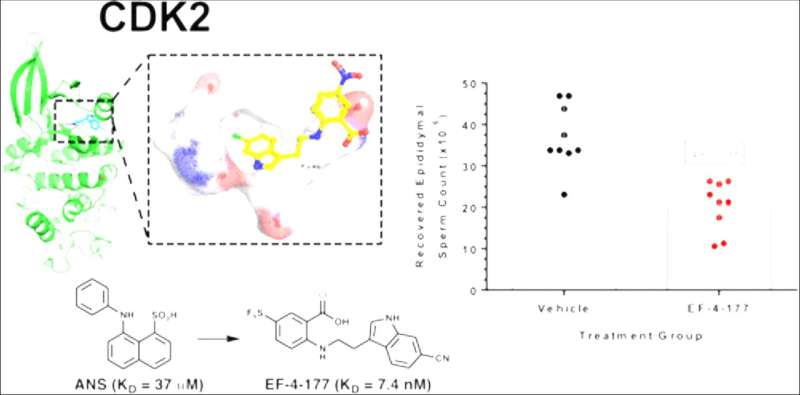This article has been reviewed according to Science X's editorial process and policies. Editors have highlighted the following attributes while ensuring the content's credibility:
fact-checked
peer-reviewed publication
trusted source
proofread
Another promising step toward non-hormonal male contraceptives

Despite birth control existing for decades, almost none of the options specifically target sperm cells. Researchers are now developing approaches that target testosterone or otherwise interrupt the sperm's ability to fertilize an egg, yet these may not work for everyone. But now, researchers publishing in the Journal of Medicinal Chemistry have identified a new candidate molecule that could become an effective non-hormonal contraceptive for many people who produce sperm.
Previously, Gunda I. Georg and colleagues investigated non-hormonal contraceptive options, as approaches targeting testosterone produced unwanted side effects. They developed a drug targeted at a specific vitamin A receptor and found that it worked as a highly effective contraceptive with no side effects. But numerous proteins are involved in forming sperm, and exploring multiple options would help increase the likelihood of one making it to human clinical trials and eventually onto the market.
Another set of proteins involved in the cell cycle are the cyclin-dependent kinases, or CDKs, which play a role in sperm cell production and tumor development. Mice without the CDK2 receptor are sterile, so a drug that targets this protein could serve as an effective contraceptive. It also has potential as a cancer therapeutic because inhibiting the enzyme slowed tumor growth in previous studies.
However, CDK2 has a very similar shape to other enzymes in its family, and currently available inhibitors tend to produce undesirable off-target effects by accidentally binding the others as well. So, Georg and her team wanted to develop a drug that could selectively inhibit CDK2 to serve as another contraceptive option.
The team previously discovered an unknown binding site in CDK2 and a commercially available dye molecule that successfully bound to it. Using the dye as a starting point, the researched screened tens of thousands of different compounds in their current work to find ones that also bound the pocket well. They narrowed the list down to just three, picking one to further optimize.
The best version, named EF-4-177, demonstrated a long half-life and good diffusion into the testes of mice. After a 28-day exposure, the animals' sperm counts decreased by about 45%. Additionally, EF-4-117 bound much more strongly to the CDK2 pocket than the dye, making it the highest affinity inhibitor for this site reported to date. The researchers say that this work proves the potential of this inhibitor for future therapeutic applications.
More information: Erik B. Faber et al, Screening through Lead Optimization of High Affinity, Allosteric Cyclin-Dependent Kinase 2 (CDK2) Inhibitors as Male Contraceptives That Reduce Sperm Counts in Mice, Journal of Medicinal Chemistry (2023). DOI: 10.1021/acs.jmedchem.2c01731





















